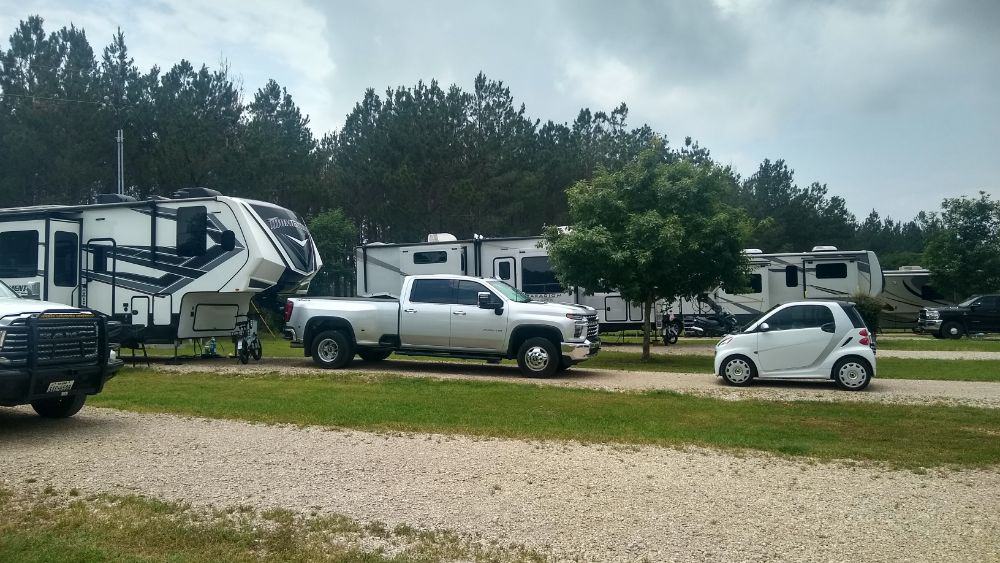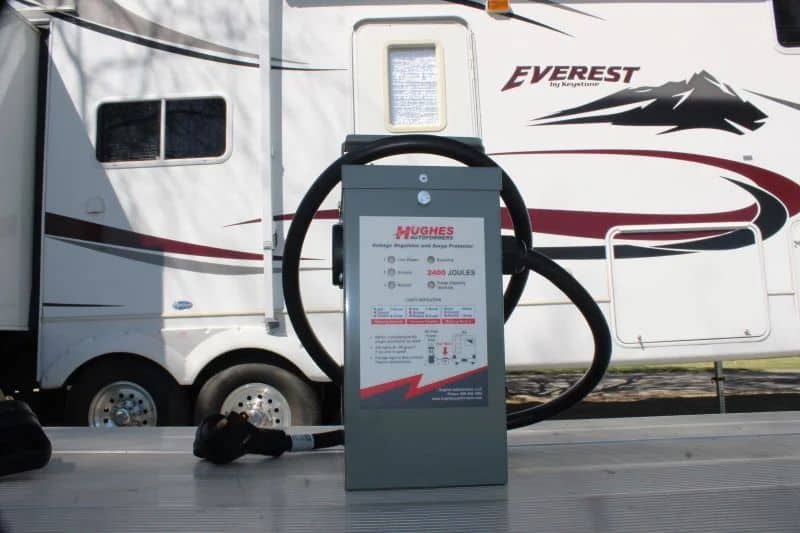This post is rated Intermediate (Blue, if you’re a skier). You don’t need to be Nikola Tesla reincarnated, but you should have a solid understanding of electrical circuits, terminology, and Ohm’s Law. Start with RV Electricity 101. This article will keep things somewhat simple for two reasons.
- You don’t need to understand Lenz’s Law and Faraday’s Law to grok the basics of voltage drop. You might need to stretch your brain, but no math is required.
- I am NOT an electrical engineer or licensed electrician. I have a B.S. in Mechanical Engineering and professional experience with AC and DC power distribution circuits, but I’m no industrial electronics expert. So for both of our sakes, we’ll keep things simple and safe.
Have You Ever Experienced Campground Low Voltage?
If you’re a serious RVer, you’ve likely encountered a campsite with low voltage. Maybe you have an EMS surge protector that alerted you with a flashing error code; maybe you tested the pedestal yourself with a multimeter; maybe your air conditioner started blowing out smoke. What causes this low voltage? Should you lodge a complaint? Can you do anything to fix it?
Why Do RV Campgrounds Have Low Voltage?
The end of our road will terminate at NEC 70 Article 551 Section 73. But before we arrive, let’s tell a story about an imaginary RV campground we’ll call “Camp Quitcherbitchin.”

During the off-season (November-March), Camp Quitcherbitchin is closed. During the on-season, about half (50%) of the sites are usually full. During summer weekends, occupancy rises to around 80%. A few times a year, like Labor Day and Independence Day, every single campsite is full and the party’s rockin’.
Now, how should we design the power distribution system for this campground? We must keep it safe, no matter what. But what about voltage drop? What about the conductor sizing? We will lose some voltage along the cables because wires possess some resistance and are not perfect conductors. So what is an acceptable voltage drop from source to load?
What Is an Acceptable Voltage Drop for an RV Campground?
Note that an “acceptable” voltage drop is usually a question of performance, not safety. Thermal-magnetic circuit breakers should trip along their trip curve regardless of voltage drop.
As of December 2023, the NEC doesn’t outline the exact requirements for voltage drop. The best practice is to aim for:
- 3% or less across any branch circuit
- 5% or less across the feeder+branch circuit
- 10% maximum for any circuit, no matter how inconsequential.
With an RV, the voltage drops keep adding up, since there will be voltage drop from the campground service panel to the campground subpanel; from the subpanel to the campsite power pedestal; from the pedestal to the RV’s panelboard; and from the panelboard to your RV outlet or appliance. Sure, there might be 120 volts Line-to-Neutral at the service drop, but what’s the voltage at Campsite ZZZ in the far back corner of the campground?
Let’s consider some numbers.
- At 120 volts nominal line voltage, a 5% voltage drop is 114 volts. That’s no problem for most appliances that run on alternating current. In fact, many are design-rated at 115 volts.
- But at 10% voltage drop, we’re looking at 108 volts, near the bottom limit for many appliances. Your air conditioner will not be happy, and it will draw more current in an attempt to maintain power output.
- Even worse, at 15% voltage drop, we’re looking at 102 volts. That’s unacceptable. Most EMS surge protectors will shut off somewhere between 102-104 volts.
Here’s the conundrum for Camp Quitcherbitchin: If the campground sizes its electrical system to match the maximum demand (July 4th weekend, when everyone’s running their air conditioners) with minimal voltage drop, then the size of the conductors will be huuuuuge. This, in turn, will drive up costs for customers. What’s our poor campground to do???

How Demand Factor Influences RV Campground Low Voltage
Enter the demand factor.
Demand factor is a concept used in electrical engineering to account for the variance between maximum and normal electrical loads. It’s also known as a utilization factor or load factor. Mathematically, it’s equal to the maximum demand of a system divided by the total connected load. In practical terms, it means the size of the feeder circuit need not always be equal to the total sizes of all the branch circuits connected to it. A mother hen needs to feed all her chicks, but not at the exact same time.
In a perfect world, demand factor isn’t necessary. But here in the real world, copper is expensive, and we’d prefer to use less of it. Demand factor allows you to build for a skewed average, for some standard deviation, not the absolute maximum requirement. A campground has huge seasonal swings in load demands. Most of the year, smaller power cables are more than sufficient to power the campground.
For this reason, the National Electric Code (NFPA 70) allows campgrounds to account for these swings with a “demand factor” that ranges from 90% for two RV campsites to 41% for 36 or more RV campsites. This demand factor significantly decreases the cost of building a campground, a savings that is (theoretically) passed on to its customers.
But during holiday summer weekends, when everyone is running their air conditioners at full tilt, something must be sacrificed – and it’s usually voltage. Come July 4th, the line voltage at Camp Quitcherbitchin will plummet like a president’s approval ratings.
How Can You Increase Campsite Voltage?
Unfortunately, there is nothing you – or the campground manager – can easily do to increase the supply voltage. The only quick n’ easy fix is to draw less current, and that normally means asking people to shut off their air conditioners.

Frustrations with low voltage cause many RV owners to use autoformers to bump up their voltage levels. This launches a domino effect, since autoformers draw more current, which further drops voltage, which draws more current … until some new, lower steady-state voltage is reached.
However, my opinion is that an autoformer is worth the trade-off since it doesn’t draw any more maximum current than your site’s circuit breaker will allow, anyway.
>>> Read More: Can You Fix Low Voltage with an Autoformer?
As RVing has become more popular and the campsites more booked, we may see changes to the NEC to reflect this new reality. The NEC may restrict the demand factor for RV campgrounds, forcing them to install larger conductors to limit voltage drop. So when the new campground charges you $100 a night “just for a place to park,” remember the real cost!
Leave a Reply